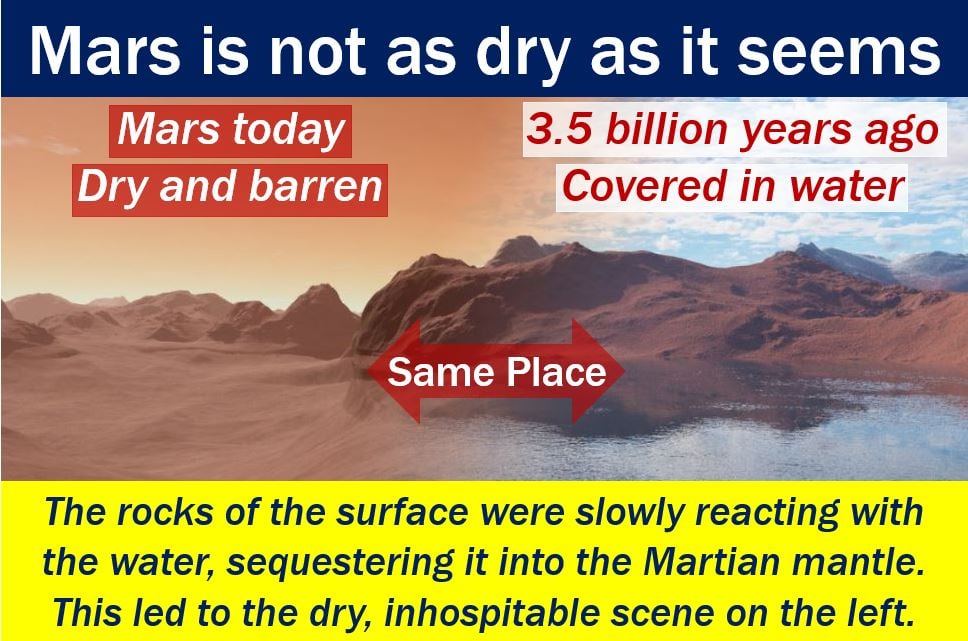Mars absorbed the abundant water that existed on its surface. That is why the Red Planet’s surface today is dry and barren, says a team of Oxford scientists. The researchers wrote that there is a trail of evidence suggesting that Mars was once a much warmer and wetter planet. In fact, water probably once flowed freely on its surface.
The researchers, from Oxford’s Department of Earth Sciences, wrote about their findings in the prestigious journal Nature. The team also included scientists from the University of Cambridge, the Colorado School of Mines, the Earth Observatory of Singapore, and Pennsylvania State University.
They propose that Mars absorbed the water when its surface reacted with it. This subsequently increased oxidation in the rocks, making the Red Planet uninhabitable.
Mars absorbed water – evidence
Previous studies have suggested that most of Mars’ water disappeared into space. This was due to the collapse of the planet’s magnet field.
When this occurred, the water either went into the subsurface as ice or blew away in the high-intensity solar winds.

Dr. Jon Wade and colleagues were almost certain that Mars’ mineralogy held the answers to the planet’s puzzling question.
The team applied modeling methods to understand the composition of our planet’s rocks. They used the method to calculate how much water Mars absorbed through its rocks due to reactions.
They assessed what role rock temperatures, sub-surface pressures, and the general Martian make up could have on the planet’s surface.
Martian rocks hold lots of water
Their results showed that the Martian basalt rocks can hold about 25% more water than those on our planet. As a result, those rocks drew the water from Mars’ surface into its interior.
According to Dr. Wade:
“People have thought about this question for a long time, but never tested the theory of the water being absorbed as a result of simple rock reactions. There are pockets of evidence that together, leads us to believe that a different reaction is needed to oxidize the Martian mantle.”
“For instance, Martian meteorites are chemically reduced compared to the surface rocks, and compositionally look very different. One reason for this, and why Mars lost all of its water, could be in its mineralogy.”
The current system of plate tectonics on Earth prevents significant changes in water levels on the surface. The rocks on Earth dehydrate efficiently before they enter the planet’s dry mantle.
However, neither early Mars nor Earth had this system of recycling water.
Regarding Mars, Dr. Wade added:
“On Mars, water reacting with the freshly erupted lavas’ that form its basaltic crust, resulted in a sponge-like effect. The planet’s water then reacted with the rocks to form a variety of water-bearing minerals.”
“This water-rock reaction changed the rock mineralogy and caused the planetary surface to dry and become inhospitable to life.”
Why was Earth different?
Regarding why the same did not happen on Earth, Dr. Wade explains that Mars is a much smaller planet than ours. It also has a different temperature profile as well as a higher iron content of its silicate mantle.
Although these distinctions appear insignificant, they cause significant effects. In fact, these effects add up considerably over time.
Regarding these distinctions, Dr. Wade said:
“They made the surface of Mars more prone to reaction with surface water and able to form minerals that contain water.”
“Because of these factors, the planet’s geological chemistry naturally drags water down into the mantle, whereas on early Earth hydrated rocks tended to float until they dehydrate.”
